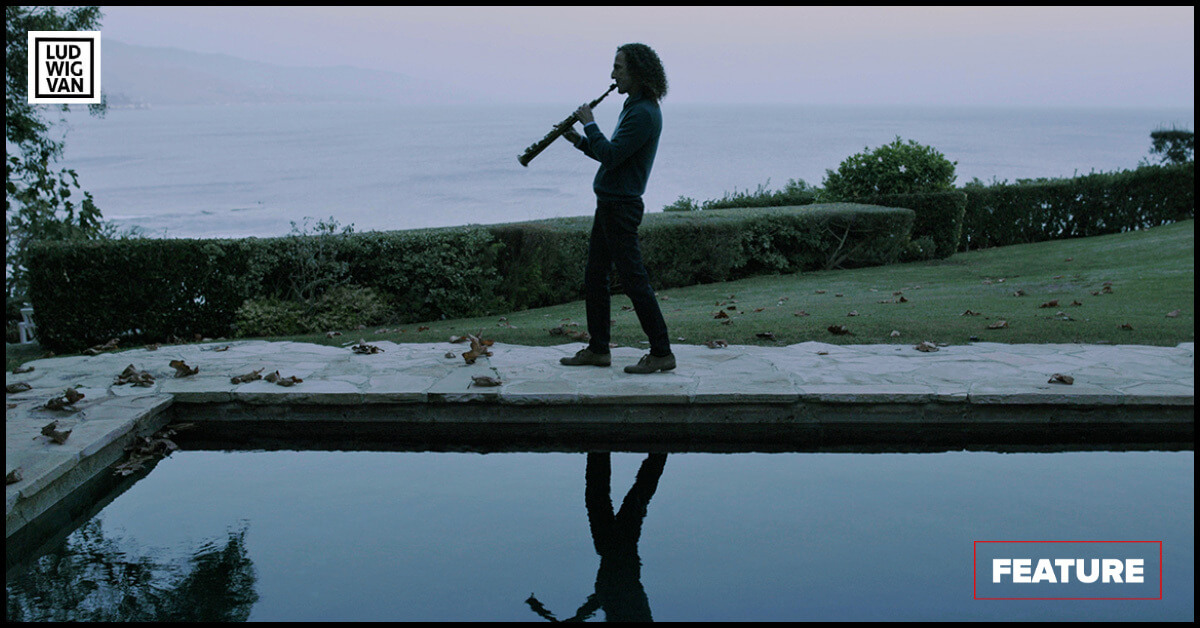
As Listening to Kenny G opens, filmmaker Penny Lane notes that the saxophonist is the best-selling instrumentalist of all time.
“I made this film to find out why this makes certain people very angry,” she adds.
You’re either fan or foe of Kenneth Bruce Gorelick and his music, but anyone living in North America, or China for that matter, over the last three decades or so has undoubtedly heard it. The film makes that point by showing it playing in shopping malls as well as in concert, and as the daily signal to leave work in Shanghai—but also during weddings and many people’s other special moments in life.
Smiling through every interview, and unshakably upbeat in his approach, Kenny frequently runs through (intentionally) impressive runs on his saxophones during his interview segments. He’s good, and he wants to tell you about it. There’s no doubt he has the chops, and he continues to practice three hours daily even at this stage of his career.
Is it good? Is it jazz?
Despite his obvious musicianship, it’s the style that grates with some critics. He’s gotten many, many disparaging reviews, and the film shows a sampling. He’s also sold upwards of 75 million records.
It’s the same kind of furor that classical music purists exude at the mention of Lang Lang, whose flamboyant style and highly successful commercialized approach to releasing and presenting his music have led to much pearl clutching.
But, what’s the accusation, exactly?
In the case of Kenny G, the accusation amounts to a down-dumbing of jazz, a notoriously esoteric genre of music, for the masses. He’s easy listening, adult contemporary—even RnB in his early releases from his debut in 1986. But, jazz…?
What, though, as Kenny himself asks in the doc, is wrong with music that’s easy to listen to? And, all those jazz festivals he’s played at would tend to reinforce his cred.
His sound is soothing, perfect for office environments and those drive-home radio shows where it first became hugely popular. Musically, there are no hard edges or high drama.
At one point, one of the critics featured in the film mentions that his music “isn’t against anything”, and that’s one of its characteristics. It takes no stance on social or any other issues, and offers only his signature soothing strains of smooth jazz, a genre that was essentially coined based on his popularity.
Kenny touches on his style when talking about a new release of original works he’s calling “new standards”, instead of the usual jazz standards he says he has no interest in. It’s a new direction in his career that circles back stylistically to the traditional jazz he started with as a precociously gifted teenager.
After coming up with the melodies, he works with an arranger to develop the chords for his compositions. This time out, he says he’s asking for darker jazz chords.

I’m a sound
“I don’t think I’m a personality to people,” he says. “I’m a sound.”
The doc does a good job of portraying Kenny as a musician and professional, from his start as the superstar of his high school jazz band, gigging in his teens, and then the various professional connections that would make his career hit the rights notes at seemingly exactly the right time.
Lane doesn’t shy from the bad reviews, or even the famous 2000 rant by jazz guitarist Pat Metheny, who was incensed at the idea of Kenny G playing that posthumous duet with Louis Armstrong.
Early in the movie, a series of film critics and experts, including The New York Times’ Ben Ratliff, PopMatters’ Will Layman, and professors from Columbia and Bard, are shown one by one. As Lane begins to play in unmistakable strains of Kenny G’s sax, each of them smiles, then squirms a little as they try to find the words to reply on camera. It’s a funny way to visualize their dilemma. “It’s just wallpaper,” one says. “I’m better than that!”
Later, they outline the jazz genre controversy. Jazz is an idiom where performers connect to the history of the music, similar to the way the classical music repertoire is acknowledged by all classical musicians. Jazz also a musical history profoundly connected with Black artists and even the Civil Rights movement.
Kenny G, not so much.
Jazz is about improvisation, and organic interplay between the musicians. Kenny G’s music is instead structured like pop music, where he’s the one star and focal point, and the rest of the ensemble exists to make him sound good. The sax is mixed like the vocals typically are— right up front.
As for his personal life, or any glimpse at an identity beyond the perennially smiling musician, his two sons are shown, but there is no hint of any other side to him. He doesn’t even seem to like listening to music—only performing.
Kenny doesn’t care about the critics
Fans of his music don’t have to worry about Kenny’s reaction to the critics. With his sales, and a newfound resurgence of fame via social media and collaborations with the likes of Kanye West, it’s not hard to see where the unflappable smile and disinterest in any and all naysaying come from.
Kenny is also unapologetic about a recording process that sees him overdub every line of music repeatedly to his notion of perfection.
Pat Metheny notwithstanding, in the spirit of his new musical direction, he’s planning another posthumous duet, this one with Stan Getz.
And, he’s not done yet. He mentions toying with the idea of writing classical music, and says he has a piece on the backburner he’s (unironically) sure will win an Oscar one day. As portrayed in the doc, he doesn’t seem to have known a moment’s insecurity in his life.
No matter what the quibbles are about genre, as one of the critics mentions, those multi-multi-million sales, all those weddings—that level of musical love has its own kind of power.
If the masses love it, can it possibly be real?
Kenny G certainly thinks so.
The movie plays on TIFF Digital on September 18, and is planned for release on HBO later this year.
#LUDWIGVAN
Get the daily arts news straight to your inbox.
Sign up for the Ludwig van Daily — classical music and opera in five minutes or less HERE.
- INTERVIEW | Composer Ari Kinarthy And Director Jeff Lee Petry Talk About Ari’s Theme, Premiering At Hot Docs - April 26, 2024
- PREVIEW | Creators & Performers Natalya Gennadi And Kristine Dandavino Talk About Grandma’s Shawl - April 26, 2024
- PREVIEW | Artistic Director Emily Cheung Dives Into Little Pear Garden Dance Company’s History & 30th Anniversary Peformance - April 26, 2024



